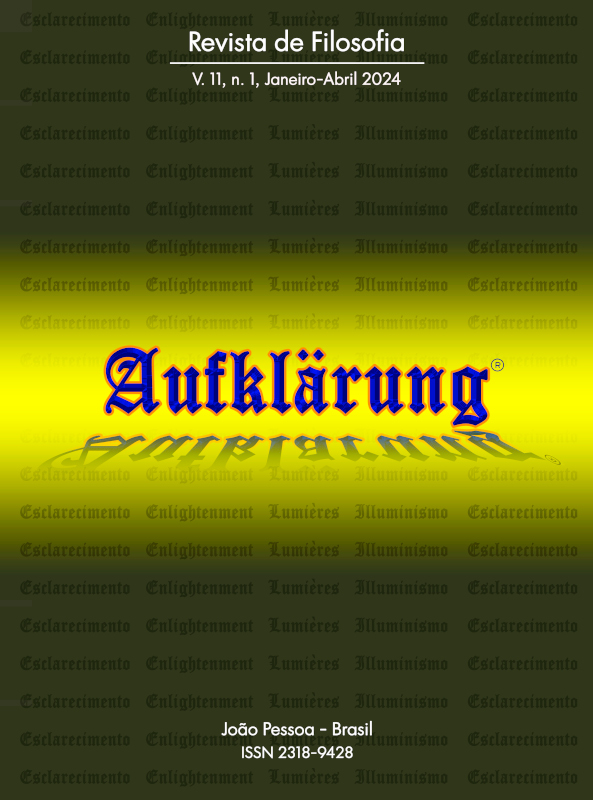As mulheres sob a ótica do Confucionismo no Vietnã a partir de uma perspectiva feminista
DOI:
https://doi.org/10.18012/arf.v11i1.70119Keywords:
Ética confucionista, Confucionismo, feminismoAbstract
O confucionismo existe, na vida espiritual do povo vietnamita, desde muito tempo. A parte positiva do Confucionismo pode-se dizer que é o fato de ele contribuir para o fortalecimento das relações familiares, entre os parentes, bem como nas relações sociais de um modo geral; outra parte positiva consiste em motivar as pessoas a desenvolverem o gosto pela leitura e aprendizagem. Estima-se que a ética confucionista precisa ser provocada, a fim de contribuir para a construção da sociedade nos dias atuais. Na contramão dessa positividade, pode-se afirmar que o confucionismo, de maneira geral, não valoriza, na medida necessária, o papel das mulheres na sociedade; na realidade, ele as classifica como pessoas insignificantes. É digno de se observar, entretanto, que, no contexto social específico do Vietnã, as mulheres encontram um lugar próprio na sociedade. Nossa pesquisa visa mostrar exatamente essa diferente concepção do papel da mulher na socidade vietnamita.
Downloads
References
Alexander B. Woodside. (1971). Việt Nam với mô hình Trung Quốc: Nghiên cứu so sánh giữa việc quản lý dân sự của nhà Nguyễn với nhà Thanh hồi nửa đầu thế kỷ 19 (Vietnam with the Chinese model: Comparative study between the civil management of the Nguyen Dynasty and the Qing Dynasty in the first half of the 19th century). Cambridge: Harvard University Press.
Ban C. (Sino-Chinese). Nữ giới toàn văn (All about women) [班昭《女诫全文》] https://www.neixun.cn/nvjie/nvjiequanwen.htm
Dampier William. (2006). Một chuyến du hành đến Đàng Ngoài năm 1688 (A trip to Tonkin in 1688). World Publishing House.
Dao D. A. (1938/1951). Việt Nam văn hóa sử cương (Vietnam's history and culture). Sai Gon: Four Directions Publishing House
De Bary, Theodore. (1988). East Asian civilization: a dialogue in five stages. Cambridge Massachusetts: Harvard University Press; cited in the work of Sun Laichen. (2010). 54
Gouvernement Général de L’Indochine. (1931). Dân luật thi hành tại các tòa Nam án Bắc kỳ (Civil law enforced in the Northern Southern courts). Ha Noi Publishing House.
Ho D. T. (2003). Lệ làng Việt Nam trong tâm thức dân gian (Vietnamese village customs in folk consciousness). Culture and Information Publishing House, Ha Noi
Hoang V. L. & N. T. (1998). Đại Việt Sử ký toàn thư (Complete history of Dai Viet) – Vol. 3. Social Sciences Publishing House, Ha Noi.
Institute of Folk Culture. (1992). Lễ hội cổ truyền (Traditional festivals). Social Sciences Publishing House, Ha Noi
Insun Yu (1994), Luật và xã hội Việt Nam thế kỷ XVII- XVIII (dịch và hiệu đính Nguyễn Quang Ngọc) (Vietnamese law and society in the 17th and 18th centuries (translated and edited by Nguyen Quang Ngoc), Social Sciences Publishing House, Ha Noi
Khong K. (Xuân Thu). (2006). Tứ thư – Ngũ kinh (The Four Books – The Five Classics). Beijing Publishing House [孔丘(春秋),《四书五经》,北京出版社,2006]
La K. M. & Pham K. (2014). [吕坤(明)(Luc Con, Minh Dynasty)《闺范》(Norms),古吴轩出版社Cổ Ngô Hiên Publishing House.
Le T. T. (1993). Phụ nữ miền Nam (The Southern Women). Museum of the Southern Women.
McHale, Frederick Shawn. (2004). Print and power: Confucianism, Communism, and Buddhism in the making of modern Vietnam, Honolulu: University of Hawaii Press
Ngo D. T. (2012). Đạo Mẫu Việt Nam (Mother Goddess Worship in Vietnam). Ha Noi: Religion Publishing House
Nguyen N. T. (2017). Confucianism and humane education in contemporary Vietnam, TC International Communication of Chinese Culture, Volume 3, Issue 4, 645–671
Nguyen N. T. Nho giáo và tính cách văn hóa Việt Nam (Confucianism and Vietnamese cultural character). https: www.vanhoahoc.edu
Nguyen V. H. (2005). Văn minh Việt Nam (Vietnamese civilization). Writers’ Association Publishing House.
Pham C. S. (2005). Gia lễ xưa và nay (Family rituals -- Past and present.) Youth Publishing House
Phan K. (1931). Gia đình ở xứ ta, nay cũng đã thành ra vấn đề rồi (những người thanh niên tự tử gợi ra vấn đề ấy) (Families in our country, now with a problem (cases suggested through young men’s committing suicide). Phu nu Tan van Magazine (May 21, 1931)
Quach T. T. (2016). ‘Nữ tứ thư’ độc bản (Women's Four Books). People's University of China Publishing House [郭淑新 《女四书读本》中国人民大学出版社]
Toan A. (2012). Nếp cũ (Old styles and habits). Tre Publishers, Ho Chi Minh City.
Tran N. T. (1996). Tìm về bản sắc văn hóa Việt Nam (The way to Vietnamese Cultural Identities). Ho Chi Minh City General Publishing House.
Tran Q. V. (2003). Văn hóa Việt Nam tìm tòi và suy ngẫm (Vietnamese culture -- exploration and contemplation). Ha Noi: Literature Publishing House.
Trinh H. D. & Huynh V. T. & Ly V. D. (translators). (2004). Gia Định Thành thông chí (Gia Dinh Citadel Information). Dong Nai Publishing House.
Tu M. Q. (Song Dynasty). “Gia Phạm” [司马光(宋)《家范》(Family model) https://www.guoxue123.com/zhibu/0101/01jf/index.htm]
Vietnam Institute of History. (1991). The Penal Code of Royal Court of the Le dynasty. Legal Publishers
Vu T. T. A. (2016). Quyền lực mềm của người phụ nữ trong văn hóa Đạo Mẫu (Women’s soft power in Mother Goddess culture). Vietnam Educational Publishing House, Ha Noi.
Additional Files
Published
How to Cite
Issue
Section
License

This work is licensed under a Creative Commons Attribution 4.0 International License.
Journal general policy
1.This journal works under a Creative Commons License aplied to online journals. That icence can be read in the following link: Creative Commons Attribution 4.0 International (CC BY 4.0).
2.Accordingly to this License, a)the journal declares that authors hold the copyright of their articles without restrictions, and they can archieve them as post-print elsewhere. b)the journal allow the author(s) to retain publishing rights without restrictions.
Metadata Policy for information describing items in the repository
1. Anyone may access the metadata free of charge at anytime.
2.The metadata may be re-used in any medium without prior permission, even commercial purposes provided the OAI Identifier or a link to the original metadata record are given, under the terms of a CC BY license refered for the Journal.







































